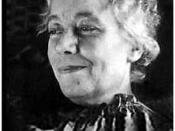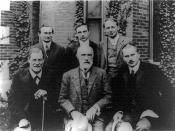I.
Theory and the Scientific Method
A. Theory - organized system of principles & ideas that help explain phenomenon & make predictions
B. Hypothesis - a statement that makes a prediction between 2 or more variables (educated guess)
C. Scientific Method - Approach used to discover accurate information about behavior and development
1. Identify and analyze the problem
2. Collect data
3. Draw conclusions
4. Revise theories
D.
Descriptive Measures
1. Observation
*naturalistic - real world settings/natural environment
*laboratory - controlled setting
2. Interviews and Questionnaires - assess perceptions and attitudes
3. Case studies - in-depth analysis of an individual
Family history Academic achievement Personal life experiences
Work history Drug & alcohol history Motives, desires, dreams
Aspirations Significant relationships Mental health history
4. Standardized Tests - assess characteristics relative to large group of similar individuals
* norms
* standards
* validity
* reliability
* Examples (MMPI-2, SAT, WISC-R, WAIS-R)
E.
Types/Strategies
1. Correlational - association or relationship between 2 variables
2. Experimental - cause and effect
* independent variable - manipulated or changed by experimenter
* dependent variable - subject's reaction/response to the change (IV)
* random assignment
F.
Time Span Research
1. Cross Sectional Approach - individuals of different ages are compared at one time
2. Longitudinal Approach - same individuals studied over a period of time
3. Sequential Approach - combination of both strategies
4. Cohort Effects - due to time of birth or generation, not actual age
G.
Research Challenges
1.
Ethics - assure the well-being
* protect from physical or emotional harm
* informed consent for all subjects
* parental consent for children
2.
Sexism - research has traditionally been male oriented and male dominated:
* both sexes should be studied before drawing conclusions
* gender differences should not be over-exaggerated
* use precise titles and...



Not easy to follow
I found the content to be very descriptive and thorough. However, I was not able to make much sense out of the organization. Moreover, it seemed to be an outline not essay.
2 out of 2 people found this comment useful.